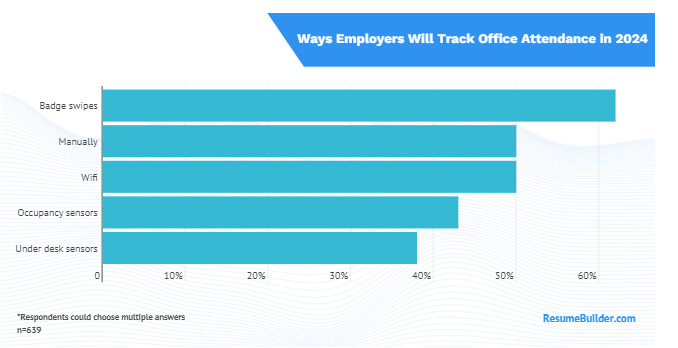
A new study on corporate return-to-office (RTO) plans shows that 8 in 10 companies say they will track employee office attendance in 2024. The survey also found that those who fail to follow company policy on in-office attendance will face negative consequences for not complying.
See what else this study found on rapidly changing company attendance policies
There is probably no clearer sign that we have moved past the pandemic era of work-from-home environment than companies forging – and enforcing – return-to-office (RTO) policies for employees. Other studies have shown that fewer companies are utilizing remote workforce strategies, while others are still offering a “hybrid” arrangement, which requires workers to work out of the company’s office several days per week on a shared (and scheduled) arrangement.
Now this latest survey reveals the tactics companies intend to use to encourage – and enforce – compliance with these new attendance policies. Clearly, the environment has changed and the balance-of-power has shifted back to the company management, after a period of employees feeling empowered to dictate their attendance arrangement.
Key Findings of the Study
This study, conducted by Resume Builders, a key resource for job seekers, found some surprising results. The key top-line items are listed below…
- 8 in 10 companies will track employee office attendance in 2024
- Fully 95% of companies say employees will suffer consequences if they don’t comply
- Jobs, bonuses, and salaries are at risk for employees who do not comply
- Productivity leads reasons for companies mandating RTO
- The most common incentives to get employees to RTO are happy hours, catered meals
Let the Tracking Begin
At this time, the survey shows that 79% of companies are currently tracking employee office attendance. In most cases, they are using badge swipes (58%).
Respondents also reported that next year, 91% of companies will require employees to go into the office on a regular monthly basis. But 75% will require in-office work weekly.

A solid majority of companies (62%) said that they will use badge swipes to track compliance with RTO rules. Other methods of tracking that were reported include: manually (50%), Wi-Fi (50%), using occupancy sensors (43%), and employing under desk sensors (38%).
Truth or Consequences
Companies that responded to this survey seem quite serious about their RTO policies – including implementing some serious consequences for those who fail to comply. Fully 95% of respondents said employees will face consequences if they do not comply.
And these consequences are serious – 1 out of 3 respondents (33%) say they will terminate employees who do not go into the office when required. Beyond firing, other consequences include the employee’s bonus being impacted (57%), their benefits being affected (54%), or a reduction of their salary (53%).
Companies that become too rigid in their policies will end up losing employees in the long term. Yes, there should be consequences for empolyees who aren’t doing their job, but time in the office isn’t the only way to track performance.
Certain positions and employees benefit from a flexible work schedule to complete their work. Forcing employees to go back to the office will negatively impact some people in the same way that some people will love it. You won’t be able to make everyone happy, but flexibility can bridge the gap.
Julia Toothacre, Resume Builder’s Resume and Career Strategist

Why Companies are Mandating RTO; Carrot and Stick
The survey also revealed why companies are mandating employees RTO. There are three key reasons management believes RTO is necessary: they believe it has a positive impact on productivity (76%), improves culture (63%), and betters employee satisfaction. Another 29% say working from the office reduces burnout.
We heard about the “stick” of consequences, but the good news is that a large majority of companies (91%) plan to provide incentives for employees – the “carrot” – to go into the office. These incentives include happy hours (52%), catered meals (46%), and upgraded office space (41%). A few employers say they will offer even bigger incentives such as raises (40%) and childcare benefits (37%).
Incentives are the Key to Successful RTO
But Resume Builder has a warning for these companies as they contemplate what incentives to offer employees to get them to RTO.
Companies need to provide RTO incentives, but happy hours aren’t it. Compensation is how to get people back to the office. working from home saves money on food, gas, car maintenance, and clothing and gives people time back in their day without a commute. Catered meals are a good start, but compensation for commuting, child care, pet care, cloting, and such would go much further for people.
It also seems like companies are not taking into consideration why employees like to work from home or have a flexible schedulee. Some people are caregivers to family members, they have a physical disability that makes the office uncomfortable, or there are mental health considerations that are improved when they can be in a familiar space, among others. When you force people back into the office, you will likely lose amazing empolyees who had been thriving in their home environment.
Toothacre
To learn more about Resume Builder, visit resumebuilder.com.





Leave a Reply